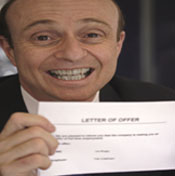The Four Noble Truths About Marketing Your Resume
By Lancelot Larsen
|
|
 | |
| When you submit your resume, yours will be one of many, stacked in a pile on your employer's desk. |
Before you start tapping away at your computer, keep these four actions in resume marketing in mind: Know Your Market, Be the Employer, Find Your Function-Accomplishment Balance, and Get Some Style.
Know the Market
It's equally as important to assess who is going to read your resume as it is to assess your career in one or two pages. Research the company and find out what service they provide and who they serve. Think about all the work you have done thus far and base the details of your experiences from the standpoint of how you will facilitate that relationship. In the end, all work is service work. Sell yourself from how you will serve well.
Do not send the same resume to every employer. Even if it means changing but a word or two, it will serve your resume well to tailor it in some way for each submission. Use the same terminology as evidenced in the advertisement or job description. Emphasize certain keywords to attract the attention of an employer just skimming down your resume. Plan which keywords will be most attractive. The content of your resume should echo the requested qualifications of the job as much as reasonably possible.
Professionals with 10 or 20 years of experience might want to consider adding a Summary of Qualifications section to the top of their resume. This would provide a snapshot of all your expertise and experience. A tidy Career Highlights section might work well also, where experience professionals can start off the resume with a few shining moments of glory throughout their career.
Be the Employer
Imagine being an employer and, on top of all your daily assignments, you also have a dozen or a hundred resumes to review for a position that needed to be filled last week. After a while, all of those resumes start to read alike—lists and lists of things a bunch of applicants did for some other people at some other place. The only question going through the mind of an employer is ''What can these people do for me?'' More often than not, that question is never addressed in resumes. By addressing it, you will stand out.
Write your resume as if the employer will examine every detail, but never think that an employer will read your resume top to bottom. In other words, expect the reality, but prepare for the ideal. Do the thinking for the employer. Write everything you think the employer wants to read at first glance. The employer will not take the time to piece together how your work history will transfer to the company. You have to take the time yourself to present your skills and experience in a way that the employer will ''get'' immediately.
 | |
| You will have to do your homework; you will have to deliver class-act communication abilities; and you will have to ace the interview. |
Find Your Function-Accomplishment Balance
Reciting the order of your places of employment and your function therein is one story. Telling all your accomplishments throughout your work history is another story. And it's hard to tell which story which employers will prefer. The goal is to find an effective balance in writing what you did while working and what impact it had where you worked. Since most applicants don't include accomplishments in their resumes, it will be an advantage if you do. Determining the balance in reciting your past functions with showcasing your crowning achievements is a challenge, but one well worth considering.
Sub-bullets
This is your definitive answer. Bullets are the best way to convey your duties at various present and past positions. Four or five is ideal for most cases. If you find that you need more, consider grouping like duties under one bullet (i.e. drafting official documents can be paired with writing professional articles for the company newsletter) or editing so as to highlight only that which is relevant to the job you seek. Then use sub-bullets to call attention to any noteworthy achievement you would like the employer to know about. If you increased revenue by a certain percent, put that in a sub-bullet. Even if you won employee of the month several times in one year, state that information in a sub-bullet.
Just remember when using sub-bullets (and bullets as well), start at the top and work your way down to the bottom. Always be willing to sacrifice standing information for outstanding information. Treat your resume like a piece of prime journalism. Start with the best, hard-hitting facts at the top.
Get Some Style
Sometimes well-qualified applicants are denied consideration for a position as a result of poor design—appearing unprofessional at the interview or communicating their worth ineffectively. The same applies to resumes. Even if the information is spectacular in a resume, it can just as easily get the brush off simply because of the look of it. Sometimes applicants with a lack of significant work experience get their resumes a better share of notice just because it is designed well.
- Always use the correct fonts. Times New Roman is the classic, but might be overused. For variety, consider Garamond, Book Antiqua, and Palatino Linotype. But stick with one of these four. Never go below 10.5 in size (or above 12). If the employer has to squint or hold your resume afar, your resume will probably not be read at all. Bullets and borders are optional. Bullets, however, make the resume more organized. Avoid long paragraphs.
- Always change the position of certain details from one submission to another. Your resume is like merchandising. Place up front that which you think the employer will want to see first and foremost. If the employer prefers someone who speaks Russian (and you happen to be fluent), add a language section at the bottom of the resume or include it in the Summary of Qualifications section at the top. If you have two jobs at the moment in nursing and editing a small medical journal, place your nursing job first if you are going to take another position somewhere else; place your editing job first if you are transitioning into the media industry.
- Always use action verbs—and in great variety. Avoid using first-person pronouns beforehand. Do not start a bullet with the same verb more than once under one place of employment.
- Always check grammar and spelling yourself. Spell-check programs won't always save you when two properly spelled words have even slightly different meanings (effect/affect).
- Always use high-quality, white, ivory, or cream-colored paper, maybe a very light gray. You can use a very, very light blue or green to make it stand out from all the white paper, but keep in mind that it might backfire if the employer reading it is more traditional. Also make sure that the paper you select will photocopy well. More than likely, your resume will be photocopied.




